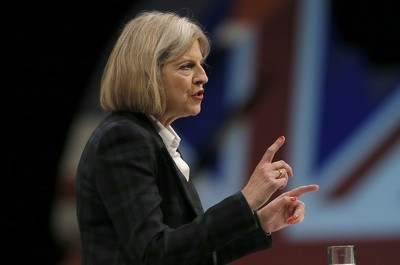Theresa May: EU Migrant Control Move Only Shuts Romanian and Bulgarian Stable Door

Home secretary Theresa May is being characteristically robust when she declares it is time the EU thought about curbing the free movement of workers around the Union. She is clearly determined to slam this particular stable door firmly shut.
What May and prime minister David Cameron are eager to do is create the impression of action just as the UK is about to open its doors to a fresh wave of migrants from Romania and Bulgaria which they can do absolutely nothing about. And they have opened a new rift with the Liberal Democrats into the bargain.
Leaked Home Office plans to put a cap on migration have been branded "illegal and unworkable" by deputy prime minister Nick Clegg whose Liberal Democrats continue to expose policy differences between them and the "nasty" Tories in the run-up to the general election.
But the prime minister is bound to use this week's EU summit to raise the issue, even though it is not on the official agenda, and he is expected to win support from other "rich" countries, particularly Germany.
Tory ministers are hugely nervous about the possible impact of a new flow of migrants from Romania and Bulgaria into Britain next year at a time when immigration and joblessness are high on voters list of concerns.
None of them will attempt to put a figure on the likely number, because of the massive underestimate made by the previous government over migrants from other accession countries. The best they can do is keep their fingers crossed and hope, thanks to the fact there are now more countries open to migrants, that things will not be as bad this time.
So what we are seeing instead is a determination to do something about it in the future, with May apparently confirming reports that she wants to impose new restrictions, possibly even a 750,000 cap, on numbers able to move to Britain each year.
"What I'm saying is that as we look ahead to the whole issue of reform of the European Union, I think we do need to look at this question of free movement," she said.
"At the moment you can restrict free movement rights for seven years. We need to look at this and think about whether that should be longer, whether it should be more flexible, whether we should look at restricting full free movement rights until, for example, a country's national income, GDP is at a certain level."
And it is that which sparked Clegg's anger as he claimed such a cap would be illegal and provoke tit-for-tat retalliation from other EU states. "If we pulled up the drawbridge now and said to German lawyers, or Finnish engineers or Dutch accountants that they can't come to work, it would be a disaster for our economy," he said.
May's remarks came on the same day she announced her "personal priority" of clamping down on modern slavery and human trafficking.
The two issues are linked by the fact that free movement has made it easier for crime as well as people to cross EU borders, although ministers are reluctant to publicly link slavery and trafficking to specific EU states, saying only that they involve a "wide range of countries".
And there is a big difference here. It is relatively straightforward to pass legislation through the British parliament to deal with slavery, which May is doing with new laws to include tougher penalties such as life imprisonment for offenders.
But getting agreement on EU migration is a very different and much bigger problem as it requires agreement across the Union, including from accession states whose workers may wish to travel to the UK. Any new rules would also impact on British workers who might want to move within the EU. It is also clear they would meet stiff opposition from the Liberal Democrats.
Cameron's suggestion about only allowing migration between countries with similar GDPs may seem attractive, but the level at which that is pitched could prove hugely sensitive and even affect Britons seeking work in, for example, Germany.
Still, May and Cameron hope to win some political points by showing they are in the forefront of the battle to finally deal with the issue, but they can do nothing about the expected influx of Romanian and Bulgarian migrants when controls come down on 1 January.
Like the euro crisis, the migration problem is the direct result of the widening of the EU, which so many politicians demanded in the past. Encouraging countries with hugely divergent economies into the Union was always going to throw up problems between the "rich" and "poor" states, and they have only been made worse by the global economic crisis.
That cannot be undone and what we are now seeing is the direct effects of that as countries, including the UK, struggle to deal with the consequences.
© Copyright IBTimes 2025. All rights reserved.






















